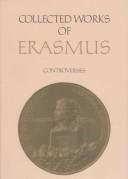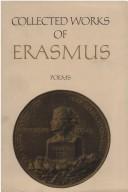| Listing 1 - 4 of 4 |
Sort by
|
Book
ISBN: 1442690305 9781442690301 Year: 2012 Publisher: Toronto [Ont.] University of Toronto Press
Abstract | Keywords | Export | Availability | Bookmark
 Loading...
Loading...Choose an application
- Reference Manager
- EndNote
- RefWorks (Direct export to RefWorks)
This volume--which translates this crucial quarrel from Latin for the first time--details the formal, wide-ranging attack on Erasmus' theories printed by the faculty in 1531, along with his two replies.
Christian literature, Latin (Medieval and modern) --- Latin Christian literature, Medieval and modern --- Latin literature, Medieval and modern --- Erasmus, Desiderius, --- Erasmus --- Erasmus, Desiderius --- Érasme --- Desiderius Erasmus --- Erasm, Dezideriĭ --- Erasme, Désiré --- Erasmo, --- Erasmo, Desidério --- Erasmus, --- Ėrazm, --- Erazm, --- Roterodamus, Erasmus --- Rotterdamskiĭ, Ėrazm --- Rotterdamský, Erasmus Desiderius --- Роттердамский, Эразм --- Эразм, --- Ерасм, Дезидерий --- Erasmus Roterodamus, Desiderius --- エラスムス, デシデリウス --- Netherlands. --- Austrian Netherlands --- Aynacha Jach'a Markanaka --- Batavia --- Belanda --- Beulanda --- Çheer Injil --- Çheer y Vagheragh --- Eben Eyong --- Háland --- Herbehereak --- Herbehereetako Erresumaren --- Hò-làn --- Holand --- Holanda --- Holandija --- Holandska --- Hōlani --- Holenda --- Holland --- Holland Királyság --- Hollandi --- Hollandia --- Hōrana --- Huēyitlahtohcāyōtl in Tlanitlālpan --- Huland --- Hulanda --- Iseldiroedd --- Iseldiryow --- Ísiltír --- Izelvroio --- Karaleŭstva Nidėrlandy --- Katō Chōres --- Kē-tē-kok --- Keninkryk fan 'e Nederlannen --- Kerajaan Landa --- Kéyah Wóyahgo Siʼánígí --- Keyatiya Nederlandan --- Kingdom of the Netherlands --- Koninkrijk der Nederlanden --- Konungsríkið Holland --- Kraljevina Holandija --- Kralojstwo Nederlandow --- Kralstvo Holandija --- Kralstvo Niderlandii͡ --- Landa --- Madalmaad --- Mamlakat Hūland --- Mamlekhet Artsot ha-Shefelah --- Nederilande --- Nederlaand --- Nederlân --- Nederland --- Nederlande --- Nederlandene --- Nederlandia --- Nederlando --- Nederlands --- Néderlandzk --- Nederlatt --- Nederlendin Nutg --- Nedŏlland --- Neerlande --- Nethiland --- Niadaland --- Niderland --- Niderland Krallığı --- Niderlanddar --- Niderlande --- Nīderlandeja --- Nīderlandes Karaliste --- Niderlandʺi͡as --- Niderlandʺi͡as Korolʹuv --- Niderlandii͡ --- Niderlandla --- Niderlandlany Korolevstvosu --- Niderlandsem --- Niderlandsen Patshalăkh --- Niderlandtæ --- Niderlandtar --- Niderlandtar Korollege --- Niderlandty Kʺarolad --- Niderlandy --- Niderlandyn Vant Uls --- Niðurlond --- Niederlande --- Nirlan --- Nižozemska --- Nizozemsko --- Nyderlandai --- Nyderlandų Karalyst --- Olanda --- Ollandia --- Oostenrijkse Nederlanden --- Oranda --- Oranda Ōkoku --- Ot͡si͡azorksshi Nederlatt --- Paes Bass --- Paesi Bassi --- Paîs Bas --- Pais Basse --- Países Baixos --- Países Bajos --- Países Baxos --- Paisis Bajus --- Països Baixos --- Paixi Basci --- Pajjiżi l-Baxxi --- Payis-Bâs --- Payises Bashos --- Pays-Bas --- Pays-Bas autrichiens --- Pays-Bas espagnols --- Pays-Bas méridionaux --- Peyiba --- Reeriaght ny Çheer Injil --- Reĝlando Nederlando --- Regni Nederlandiarum --- Regno del Paises Basse --- Regnu di i Paesi Bassi --- Reino di Hulanda --- Reino dos Países Baixos --- Ríocht na hÍsiltíre --- Royaume des Pays-Bas --- Southern Netherlands --- Spanish Netherlands --- The Netherlands --- Tìrean Ìsle --- Tlanitlālpan --- Ubuholandi --- Ubuhorandi --- Ufalme wa Nchi za Chini --- Uholanzi --- Ulanda --- Ulanna --- Vasileio tōn Katō Chōrōn --- Walanda --- Zuidelijke Nederlanden --- Desiderius Erasmus, --- Erasm, Dezideriĭ, --- Erasme, Désiré, --- Erasmo, Desidério, --- Roterodamus, Erasmus, --- Rotterdamskiĭ, Ėrazm, --- Rotterdamský, Erasmus Desiderius, --- Роттердамский, Эразм, --- Ерасм, Дезидерий, --- אראסמוס, דסידריוס,
Book
ISBN: 0300195222 9780300195224 1306407702 9781306407700 9780300186109 030018610X Year: 2014 Publisher: New Haven, Conn. London
Abstract | Keywords | Export | Availability | Bookmark
 Loading...
Loading...Choose an application
- Reference Manager
- EndNote
- RefWorks (Direct export to RefWorks)
Saint Thomas More's Utopia is one of the most important works of European humanism and serves as a key text in survey courses on Western intellectual history, the Renaissance, political theory, and many other subjects. Preeminent More scholar Clarence H. Miller does justice to the full range of More's rhetoric in this masterful translation. In a new afterword to this edition, Jerry Harp contextualizes More's life and Utopia within the wider frames of European humanism and the Renaissance. "Clarence H. Miller's fine translation tracks the supple variations of More's Latin with unmatched precision, and his Introduction and notes are masterly. Jerry Harp's new Afterword adroitly places More's wonderful little book into its broader contexts in intellectual history."-George M. Logan, author of The Meaning of More's "Utopia" "Sir Thomas More's Utopia is not merely one of the foundational texts of western culture, but also a book whose most fundamental concerns are as urgent now as they were in 1516 when it was written. Clarence H. Miller's wonderful translation of More's classic is now happily once again available to readers. This is the English edition that best captures the tone and texture of More's original Latin, and its notes and introduction, along with the lively afterward by Jerry Harp, graciously supply exactly the kinds of help a modern reader might desire."-David Scott Kastan, Yale University
Utopias. --- Ideal states --- States, Ideal --- Utopian literature --- Political science --- Socialism --- Voyages, Imaginary --- Dystopias --- Utopias

ISBN: 0802047564 1442673443 9781442673441 9780802047564 Year: 2000 Volume: 77 Publisher: Toronto [Ont.] University of Toronto Press
Abstract | Keywords | Export | Availability | Bookmark
 Loading...
Loading...Choose an application
- Reference Manager
- EndNote
- RefWorks (Direct export to RefWorks)
"Erasmus' controversies with French, Italian, Spanish, and German critics on theological, social, philological, educational, and other matters are contained in volumes 71-84 of the Collected Works. CWE 76 includes two of his most important disputes with Luther, A Discussion of Free Will and the first part of the Hyperaspistes (usually translated as 'protector' or 'shield-bearer'). Erasmus writes in response to Luther's The Enslaved Will and rebukes Luther for what he considers his arrogance and his insulting charge that Erasmus is an atheist. In CWE 76, Hyperaspistes 1 deals with a number of general considerations in approaching the question of free will. In CWE 77, Hyperaspistes 2 examines in detail the biblical passages put forth in defence of free will in A Discussion of Free Will and Luther's refutation of that defence in The Enslaved Will. In these two volumes of bitter dispute with Luther, Erasmus shows once again that he is a humanist in his theology and a theologian in his humanism."--Jacket
Christian literature, Latin (Medieval and modern) --- Latin Christian literature, Medieval and modern --- Latin literature, Medieval and modern --- Luther, Martin, --- Free will and determanism. --- Erasmus, Desiderius, --- Erasmus, Desiderius --- Érasme --- Desiderius Erasmus --- Erasm, Dezideriĭ --- Erasme, Désiré --- Erasmo, --- Erasmo, Desidério --- Erasmus, --- Ėrazm, --- Erazm, --- Roterodamus, Erasmus --- Rotterdamskiĭ, Ėrazm --- Rotterdamský, Erasmus Desiderius --- Роттердамский, Эразм --- Эразм, --- Ерасм, Дезидерий --- Erasmus --- Erasmus Roterodamus, Desiderius --- エラスムス, デシデリウス --- 873.4 ERASMUS ROTERODAMUS, DESIDERIUS --- 873.4 ERASMUS ROTERODAMUS, DESIDERIUS Humanistisch Latijnse literatuur--ERASMUS ROTERODAMUS, DESIDERIUS --- Humanistisch Latijnse literatuur--ERASMUS ROTERODAMUS, DESIDERIUS --- Érasme, --- Christian literature, Latin (Medieval and modern) - Netherlands - Translations into English. --- Desiderius Erasmus, --- Erasm, Dezideriĭ, --- Erasme, Désiré, --- Erasmo, Desidério, --- Roterodamus, Erasmus, --- Rotterdamskiĭ, Ėrazm, --- Rotterdamský, Erasmus Desiderius, --- Роттердамский, Эразм, --- Ерасм, Дезидерий, --- אראסמוס, דסידריוס, --- De servo arbitrio (Luther, Martin) --- De servo arbitrio Martini Lutheri (Luther, Martin) --- Servum arbitrium (Luther, Martin)

ISBN: 0802028675 148752076X 1442678569 9781442678569 9780802028679 1487512414 9781487520762 Year: 1993 Volume: 85-86 Publisher: Toronto Buffalo University of Toronto Press
Abstract | Keywords | Export | Availability | Bookmark
 Loading...
Loading...Choose an application
- Reference Manager
- EndNote
- RefWorks (Direct export to RefWorks)
The final two volumes in the CWE contain an edition and translation of Erasmus's poetry. For Erasmus scholars this work affords the first opportunity to evaluate and analyse Erasmus' poems in English. And for those interested in Renaissance and Reformation poetry in general, these offer an intriguing look at the work of one of the towering figures of the period writing in a genre that was, for him, unusual.The annotations include a path-breaking commentary piece by Harry Vredeveld on Erasmus' most famous poem, `Poem on the Trouble of Old Age.' Another important feature is the appearance of the original Latin of each poem alongside the English translation.
Neo-Latin literature --- Latin poetry, Medieval and modern --- -Latin literature, Medieval and modern --- Translations into English --- Erasmus, Desiderius --- -Translations into English --- Latin poetry. --- Erasmus, Desiderius, --- Érasme --- Desiderius Erasmus --- Erasm, Dezideriĭ --- Erasme, Désiré --- Erasmo, --- Erasmo, Desidério --- Erasmus, --- Ėrazm, --- Erazm, --- Roterodamus, Erasmus --- Rotterdamskiĭ, Ėrazm --- Rotterdamský, Erasmus Desiderius --- Роттердамский, Эразм --- Эразм, --- Ерасм, Дезидерий --- Translations into English. --- Latin literature --- Erasmus Roterodamus, Desiderius --- Erasmus --- エラスムス, デシデリウス --- 873.4 ERASMUS ROTERODAMUS, DESIDERIUS --- 873.4 ERASMUS ROTERODAMUS, DESIDERIUS Humanistisch Latijnse literatuur--ERASMUS ROTERODAMUS, DESIDERIUS --- Humanistisch Latijnse literatuur--ERASMUS ROTERODAMUS, DESIDERIUS --- Erasmus, Desiderius, - -1536 - Translations into English --- Authors, Latin (Medieval and modern) --- Auteurs latins --- Vie intellectuelle --- Humanists --- Humanistes --- Traductions anglaises. --- Sources. --- Érasme, --- Netherlands --- Intellectual life --- Desiderius Erasmus, --- Erasm, Dezideriĭ, --- Erasme, Désiré, --- Erasmo, Desidério, --- Roterodamus, Erasmus, --- Rotterdamskiĭ, Ėrazm, --- Rotterdamský, Erasmus Desiderius, --- Роттердамский, Эразм, --- Ерасм, Дезидерий, --- אראסמוס, דסידריוס, --- Erasmus, Desiderius, - -1536 --- Érasme, --- Humanists.
| Listing 1 - 4 of 4 |
Sort by
|

 Search
Search Feedback
Feedback About UniCat
About UniCat  Help
Help News
News